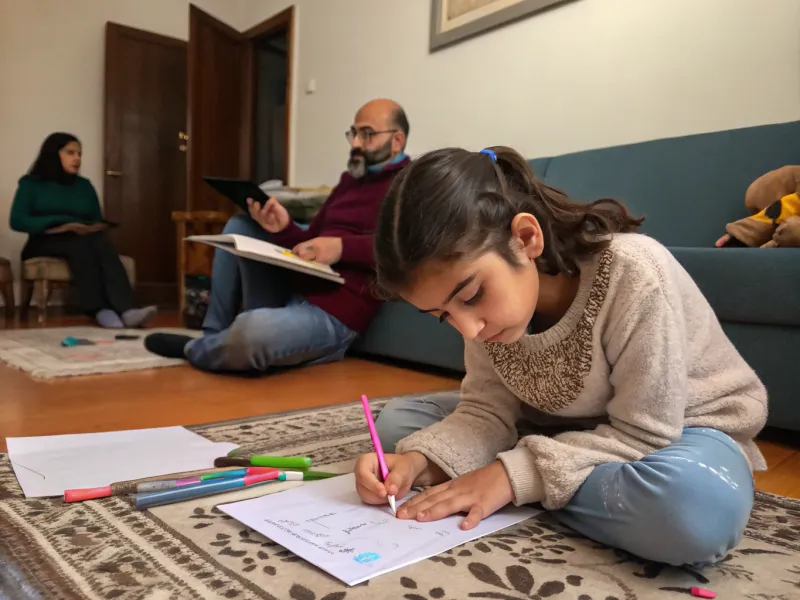22 señales sorprendentes de que su infancia fue más disfuncional de lo que pensaba
Ever found yourself pondering over the quirks of your childhood? You know, those little things that seemed normal back then but now make you go, “Wait, what was that all about?” Today, we’re diving into the world of childhood experiences with a sprinkle of humor and a dash of empathy.
It’s all about those moments that might have been a bit more dysfunctional than we realized. Think of this as a friendly chat over coffee, where we laugh a little, reflect a bit, and maybe share an “aha” moment or two.
So, let’s jump into these subtle signs that your childhood might not have been as picture-perfect as it seemed. No judgment here, just a space to explore and understand!
1. Negligencia emocional

Emotional neglect can be like wearing shoes a size too small—uncomfortable and hard to ignore, but somehow you managed. As a kid, maybe you didn’t get the hugs or words of comfort when needed. It wasn’t about not being loved; it was just not being expressed.
Tal vez tus padres estaban allí físicamente pero no emocionalmente conectados, dejándote un poco como una isla.
Al crecer, puede que lo hayas ignorado, pensando que era normal. Pero de adulto te das cuenta del impacto que tiene en tu capacidad para expresar emociones y conectar con los demás.
Understanding this doesn’t mean blaming anyone. It’s more about recognizing patterns that might have shaped who you are today. Acknowledging it can be the first step toward healing.
Maybe it’s time to give yourself the emotional support you missed back then. A warm hug, even if just from yourself, can be oddly comforting. Remember, it’s okay to seek out therapy or talk to friends who understand. You’re not alone, and opening up can be liberating.
2. Enmeshment

Oh, enmeshment, the invisible web that ties everyone a bit too closely. Imagine growing up in a family where everyone’s business was everyone’s business. Privacy? Never heard of it. Your thoughts, feelings, and even friendships might have felt like community property.
En esos entornos, la independencia era un bien escaso. Las decisiones se tomaban a menudo en grupo y el espacio personal era como un unicornio mítico. De niño, aprendías a seguir la línea, mezclando tu identidad con la de los que te rodeaban. Ahora, como adulto, desenredarse de esta red puede parecer como separar espaguetis.
Realizing this pattern is the first step to creating boundaries. It’s okay to have your own thoughts and feelings. Practice saying “no” without guilt and explore what you genuinely enjoy. It might be daunting, but embracing your individuality is essential. And remember, there are others who understand this struggle.
3. Favoritismo paterno

Ah, the classic tale of parental favoritism, where one sibling seems to hold the golden crown. Maybe your brother was the sports star, or your sister the academic genius. Meanwhile, you were left feeling like the understudy, waiting for your chance to shine.
This experience can seep into adulthood, fostering feelings of inadequacy and rivalry. You might even find yourself seeking validation in every little achievement. It’s like carrying an invisible scoreboard, always comparing yourself to others.
But here’s the truth: your worth isn’t defined by comparison. Acknowledging these feelings is crucial, and it might be time to redefine success on your terms. Celebrate your unique talents and remember that each sibling had their own challenges.
Healing might involve open conversations with family or seeking support from friends or a therapist. You’re more than enough just as you are.
4. Dinámicas familiares tóxicas

Toxic family dynamics are like the storm clouds that never seem to clear. Arguments, silent treatments, and unpredictable moods might have been the norm. You learned to walk on eggshells, always anticipating the next eruption.
Crecer en un entorno así te enseña a leer la habitación con precisión, pero a menudo a costa de tu propia paz. Ahora, de adulto, estos patrones pueden manifestarse en tus relaciones, volviéndote hipervigilante o reacio a los conflictos.
Recognizing these dynamics is the first step toward change. It’s okay to distance yourself from negativity and seek environments that nourish your well-being. Building healthy relationships takes time, and seeking professional help can provide guidance.
Recuerda que mereces una vida llena de calidez y comprensión.
5. Falta de límites

En la infancia, los límites podían parecer líneas en la arena, fácilmente borradas por la marea de las exigencias familiares. Ya fuera tu habitación, tus pensamientos o tus amistades, nada parecía estar fuera de los límites. El espacio personal era a menudo un lujo, no un derecho.
As you grow, the absence of boundaries can lead to difficulties in asserting yourself. You might struggle to say “no,” fearing disappointment or conflict. It’s like living without a fence, leaving you vulnerable to the world.
But here’s the empowering part: you can build those boundaries now. Start by defining what feels comfortable for you and communicate it clearly. Practice makes perfect, and remember, saying “no” is a complete sentence. Building fences doesn’t mean you’re shutting others out; it’s about protecting your peace.
6. Expectativas poco realistas

Tener expectativas poco realistas puede ser como cargar con una mochila llena de ladrillos. Tal vez se esperaba que sobresalieras en los estudios, los deportes y las habilidades sociales a la vez. Cualquier cosa que no fuera la perfección te parecía un fracaso.
En la edad adulta, esta presión puede manifestarse como estrés crónico y miedo a cometer errores. La búsqueda de la perfección puede ser agotadora y dejar poco espacio para la autocompasión. Incluso es posible que la alegría por los logros sea efímera, persiguiendo siempre el siguiente objetivo.
La clave está en reconocer que la perfección es una ilusión. Acepta tus imperfecciones y aprende a fijarte objetivos realistas. Celebra las pequeñas victorias y recuerda que el progreso importa más que la perfección.
Therapy or mindfulness practices can help reframe these expectations. You’re worthy, and it’s okay to forge your path.
7. Amor condicional

El amor condicional es como un sistema de recompensas, en el que el amor y la aprobación se reparten en función de los logros. Tal vez te sentías amado sólo cuando destacabas en la escuela o en los deportes. Puede que te pareciera que el amor era transaccional, ligado a tus logros.
This can lead to an endless pursuit of validation, leaving you questioning your self-worth. In adulthood, you might find yourself constantly seeking approval and fearing failure. It’s like being on a treadmill, never reaching the finish line.
The realization that love shouldn’t be conditional is a powerful awakening. Embrace your true self and seek relationships where love is given freely. Remember, you’re deserving of love just for being you. Therapy and self-reflection can aid in breaking these patterns and building healthier connections.
8. Volatilidad emocional

Emotional volatility can be like living on a roller coaster, never knowing when the next dip will come. Perhaps one moment was filled with laughter, and the next with tears or anger. Growing up in such an environment teaches you to be on guard, always ready for the next emotional storm.
These experiences might lead to emotional instability in adulthood, where mood swings feel overwhelming. You might struggle to trust your feelings, fearing they’ll spiral out of control.
Understanding this pattern is the first step in finding emotional balance. Practice mindfulness or seek professional guidance to help you navigate these emotions. Building a support system with friends who understand can provide stability. Remember, it’s okay to feel and express your emotions.
9. Disciplina basada en el miedo

La disciplina basada en el miedo puede sentirse como vivir bajo una nube oscura, siempre receloso de pasarse de la raya. Puede que los castigos fueran severos o impredecibles, dejándote en un estado constante de ansiedad. Este enfoque puede haber moldeado tu comportamiento, haciéndote obediente pero temeroso.
As an adult, this might manifest as a fear of authority or difficulty asserting yourself. You may find yourself avoiding conflict at all costs, even when it’s necessary.
Reconocer este patrón es esencial para el crecimiento. Practica la autocompasión y comprende que los errores forman parte del aprendizaje. Busca entornos en los que te sientas seguro para expresarte. La terapia puede proporcionar herramientas para aumentar la confianza y la asertividad. Recuerda que tienes derecho a defenderte.
10. Falta de apoyo

La falta de apoyo puede ser como aprender a montar en bicicleta sin ruedines. Tal vez te enfrentaste a los retos tú solo, sintiendo que no había red de seguridad. El apoyo era escaso y aprendiste a ser autosuficiente, a veces hasta la exageración.
In adulthood, this might manifest as difficulty asking for help, fearing it shows weakness. You might even struggle with vulnerability, keeping others at arm’s length.
The first step is recognizing that seeking support is a strength, not a weakness. Build a network of friends or family who offer encouragement. Consider seeking professional guidance to explore these patterns. Remember, it’s okay to lean on others, and you don’t have to face everything alone.
11. Sobreprotección

Overprotection can feel like living in a bubble, shielded from the world but also limited in exploration. Perhaps your parents were overly cautious, restricting your activities to keep you safe. While well-intentioned, this might have left you feeling unprepared for life’s challenges.
As an adult, you might struggle with decision-making or fear taking risks. The world can seem daunting when you’ve always been sheltered.
Recognizing this pattern is the first step toward independence. Embrace small challenges and learn from them. Build resilience by stepping out of your comfort zone. Remember, it’s okay to stumble; each experience is a lesson. You’re capable of navigating life’s complexities with confidence.
12. Implicación excesiva

El exceso de implicación puede sentirse como vivir en una pecera, constantemente observado y guiado. Puede que tus padres se implicaran mucho en todos los aspectos de tu vida, desde tus deberes hasta tus amistades. Puede que te apoyaran, pero también puede que te agobiaran.
En la edad adulta, esto puede llevar a una falta de autonomía, a luchar por tomar decisiones sin orientación. Puede que incluso busques aprobación para cada decisión, por miedo a equivocarte.
Recognizing this pattern can help you build independence. Practice making decisions on your own and trust your instincts. It’s okay to seek advice, but remember, you have the final say. Building confidence takes time, but each step is progress. You’re more capable than you realize.
13. Minimización de los sentimientos

Minimization of feelings can feel like having your emotions swept under the rug. Maybe when you expressed sadness or frustration, it was met with “It’s not a big deal” or “You’ll get over it.” Over time, you learned to suppress your feelings, believing they weren’t valid.
Esto puede provocar dificultades de expresión emocional en la edad adulta, por miedo a ser juzgado o rechazado. Es posible que te cueste articular tus sentimientos, reprimiéndolos.
The first step is acknowledging that your feelings are valid and deserve to be expressed. Practice opening up to trusted friends or a therapist who understands. Remember, emotions are a natural part of being human, and sharing them can deepen connections. It’s okay to feel and be heard.
14. Funciones y normas poco claras

La falta de claridad en los roles y las normas puede ser como jugar a un juego sin conocer las reglas. Puede que las expectativas familiares fueran incoherentes o cambiaran constantemente, dejándote inseguro de cuál era tu lugar. Esto puede haber provocado confusión y ansiedad, al tener que adivinar siempre lo que se esperaba de ti.
En la edad adulta, esto puede manifestarse como dificultad para establecer límites o comprender las normas sociales. Puede que te encuentres adaptándote a diferentes roles, intentando encajar sin perderte a ti mismo.
Recognizing this pattern is essential for building stability. Establish clear boundaries and communicate them effectively. Practice asserting your needs and understanding your role in relationships. Therapy can provide guidance in clarifying these dynamics. Remember, it’s okay to define your path and embrace who you are.
15. Conflictos parentales

Los conflictos entre padres pueden ser como vivir en una zona de guerra, con las palabras como armas y el silencio como escudo. Tal vez tus padres discutían con frecuencia y tú te veías atrapado entre dos fuegos. Puede que hayas desempeñado el papel de mediador, intentando mantener la paz.
Estas experiencias pueden provocar dificultades en las relaciones, miedo al conflicto o excesiva complacencia. Es posible que te cueste expresar tus necesidades, por miedo a discutir.
Understanding this pattern is the first step toward change. Practice open communication and set boundaries in relationships. Therapy can provide tools to navigate conflicts healthily. Remember, it’s okay to express your needs and seek harmony without sacrificing yourself.
16. Presión por exceso de rendimiento

La presión del rendimiento excesivo puede sentirse como estar en una rueda de hámster, siempre corriendo pero sin llegar nunca a la meta. Puede que se hiciera hincapié en el éxito y que todo lo que no fuera eso se considerara un fracaso. Es posible que te hayan animado a destacar en todos los ámbitos, desde el académico hasta las actividades extraescolares.
En la edad adulta, esto puede manifestarse como estrés crónico, buscando siempre la perfección. Puede que te cueste encontrar satisfacción en los logros, persiguiendo siempre el siguiente objetivo.
Recognizing this pattern is crucial for achieving balance. Set realistic goals and celebrate progress, not perfection. Practice self-compassion and understand that it’s okay to take a break. Therapy can provide support in navigating these expectations. You’re enough just as you are, and it’s okay to enjoy the journey.
17. Desestimación de la identidad

Dismissal of identity can feel like wearing clothes that don’t fit, always trying to mold yourself to others’ expectations. Perhaps your individuality was discouraged, with pressure to conform to family norms. You might have felt like your true self was hidden, afraid of disapproval.
En la edad adulta, esto puede conducir a una lucha con la identidad propia, buscando constantemente la validación de los demás. Puede que te cueste aceptar tu singularidad por miedo a ser juzgado.
The first step is recognizing that your identity is valid and deserves to be expressed. Embrace your individuality and explore what genuinely brings you joy. It’s okay to stand out and be yourself. Therapy or self-reflection can aid in building self-acceptance. You’re unique, and that’s your strength.
18. Paternidad incoherente

Inconsistent parenting can feel like trying to solve a puzzle with missing pieces. Perhaps rules and expectations varied, leaving you unsure of what was right or wrong. One day, a behavior was acceptable, and the next, it wasn’t.
This inconsistency can lead to anxiety and confusion in adulthood, always guessing others’ expectations. You might find it hard to trust your judgment, fearing you’ll make mistakes.
Recognizing this pattern is essential for building stability. Establish clear boundaries and communicate them effectively. Practice trusting your instincts and understanding your values. Therapy can provide guidance in navigating these challenges. Remember, it’s okay to define your path and embrace who you are.
19. Descuido de los talentos

La falta de atención a los talentos puede ser como cantar en un coro donde nadie oye tu voz. Tal vez se pasaron por alto tus habilidades únicas y te faltó apoyo. Puede que te hayan animado a centrarte en caminos tradicionales, dejando tus pasiones sin explorar.
In adulthood, this might lead to a lack of confidence in your abilities or fear of pursuing your dreams. You may struggle to believe in your talents, fearing they’ll go unnoticed.
The first step is recognizing that your talents are valuable and deserve attention. Explore your passions and seek environments that nurture your creativity. Therapy or mentorship can provide support in building confidence. Remember, it’s okay to shine in your own way and pursue what brings you joy.
20. Falta de comunicación

Lack of communication can feel like living in a house with walls but no windows. Perhaps conversations were rare, and emotions were unspoken. You might have learned to keep your thoughts to yourself, fearing they’d go unheard.
En la edad adulta, esto puede provocar dificultades para expresarse o establecer vínculos. Puede que te cueste abrirte, por miedo a la vulnerabilidad.
The first step is recognizing that communication is a skill that can be cultivated. Practice expressing your thoughts and feelings with trusted friends or a therapist. Build connections by sharing experiences and listening actively. Remember, it’s okay to have a voice and to be heard. You’re not alone, and expressing yourself can lead to more meaningful relationships.
21. Parentification

Parentification is when the roles in the family quietly flip. Maybe you were the one comforting your parent after a tough day or managing responsibilities way beyond your years. While your peers were worried about school projects, you were handling emotions, finances, or household duties.
As a child, it might have felt like being needed. But in adulthood, it often translates into chronic over-responsibility, burnout, or feeling guilty when prioritizing your own needs. You may find it hard to relax or ask for help, always feeling like you have to “hold it all together.”
Recognizing this dynamic doesn’t diminish your strength—it honors the resilience you developed. But now, it’s okay to put the superhero cape down. Allow yourself rest, joy, and support. You deserve to be cared for, too. Healing starts with giving yourself the nurturing you once gave to others.
22. Passive-Aggressive Environment

Growing up in a passive-aggressive environment is like playing emotional charades—no one says what they mean, and you’re left guessing. Instead of direct conversations, feelings were expressed through sarcasm, silent treatments, or backhanded compliments.
As a kid, this might have made you second-guess everything. Now, you might struggle with confrontation, unsure how to express yourself honestly without fear or confusion.
It’s okay to unlearn those patterns. Direct, respectful communication is not only possible—it’s freeing. Practicing assertiveness and setting emotional boundaries can help you feel more confident and connected. And remember, it’s not rude to speak your truth; it’s actually incredibly kind—to yourself and others.







